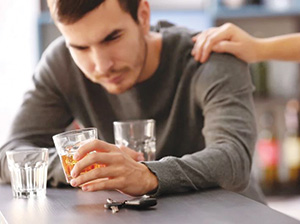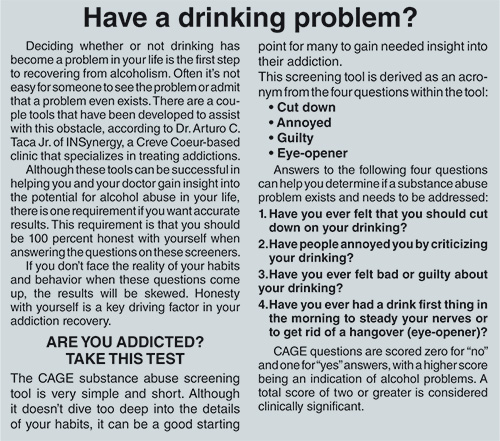 Alcoholism runs in families, studies show. According to Dr. Arturo C. Taca Jr. of INSynergy, a Creve Coeur-based clinic that specializes in treating addictions, researchers have found that drinking behavior is linked to the “pleasure and reward” pathways in the brain.
Alcoholism runs in families, studies show. According to Dr. Arturo C. Taca Jr. of INSynergy, a Creve Coeur-based clinic that specializes in treating addictions, researchers have found that drinking behavior is linked to the “pleasure and reward” pathways in the brain.
The chemical most responsible for this reward circuit is called dopamine. This is the same system that rewards pleasurable events like eating, sex and positive social interactions, Dr. Tac said. Some people, when exposed to alcohol, have in their genes an unusually exaggerated euphoric response (more dopamine).
ALCOHOL DEPENDENCE CHANGES YOUR BODY
Alcohol dependence means there has been a change in the body’s physiology. This change in the body’s tolerance requires a greater amount of alcohol to produce the same effect. In other words, it takes more drinks to get high. The result is an addiction to alcohol.
According to government statistics, nearly eight million Americans over the age of 18 have alcohol dependence.
 Once a person has alcohol addiction, Taca notes in an article in Health and Wellness magazine, many things can happen over time: liver failure, bleeding disorders, enlargement of the heart, seizures – and even brain damage called dementia.
Once a person has alcohol addiction, Taca notes in an article in Health and Wellness magazine, many things can happen over time: liver failure, bleeding disorders, enlargement of the heart, seizures – and even brain damage called dementia.
“Getting alcoholism under control is the first step before any of these medical conditions occur,” Taca writes. “Most people can successfully cut down drinking and maintain a healthy and sober lifestyle; however, many cannot and require medical interventions before it is too late.”
In general, Taca points out, “people begin drinking or do drugs for a variety of reasons: to feel good, to fit in, to lessen pain or depression – even to enhance performance. These usually start out as life choices.”
Experimenting with alcohol and drugs may be a normal phase of growing up for some people and goes away in time. Others, however, continue to drink, use drugs, have problems with self- control or impaired judgment, and cause negative consequences at home and at work as addiction settles in and takes control.
ALCOHOL CAN AFFECT YOUR HEALTH
While alcohol abuse can have a negative affect on your personal life – including your job, friends, and family – it is widely known that there are many adverse health effects associated with excessive alcohol consumption.
Here is a significant list of alcohol’s effects on the body, which all lead to either putting yourself in harm’s way on a psychological level or physical level:
- Alcohol interrupts the brain’s pathways, which can affect the way the brain functions. Over time, it can even change the way the brain looks. Additionally, alcohol impairs motor and cognitive functioning. Unpleasant mood and behavior changes can also occur.
- Excessive drinking can also cause heart problems such as arrhythmias, cardiomyopathy (stretching of the heart muscle), high blood pressure and stroke.
- The risk of liver problems such as cirrhosis, fibrosis, steatosis (fatty liver), or alcoholic hepatitis can increase dramatically.
- Alcohol causes the pancreas to produce toxic substances that can eventually lead to pancreatitis, a dangerous inflammation and swelling of the blood vessels in the pancreas that prevents proper digestion.
- The risk of various cancers may increase due to excessive consumption of alcohol, such as liver cancer, esophageal cancer, colorectal cancer, breast cancer and head and neck cancer.
- Your immune system can be weakened as a result of excessive drinking. Drinking a lot on a single occasion slows your body’s ability to ward off infections – even up to 24 hours after getting drunk.
 INNOVATIVE TREATMENTS
INNOVATIVE TREATMENTS
If you are at a point where you think your drinking has gotten out of control, contact Taca and his team at INSynergy to discuss the benefits of medically supervised alcohol detox and all of the innovative treatment options available today.
“Alcohol addiction treatment programs should be individualized and tailored to give clients choices, resources and support to take responsibility for their medical and psychological needs,” he said. “Detox is essential, especially when signs of withdrawal are present, which can be life-threatening.”
INSynergy provides daily, non-12-step, non-AA, CBT (cognitive behavior therapy) process groups as part of the comprehensive treatment program. INSynergy also provides weekly open group sessions for family, spouses and children of clients in the program.
INSynergy is located at 11477 Olde Cabin Road, Suite 210, in Creve Coeur. For information call (314) 649-7867 and visit www.insynergystl.com/alcohol-addiction.

